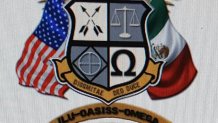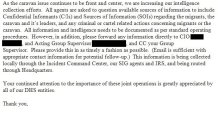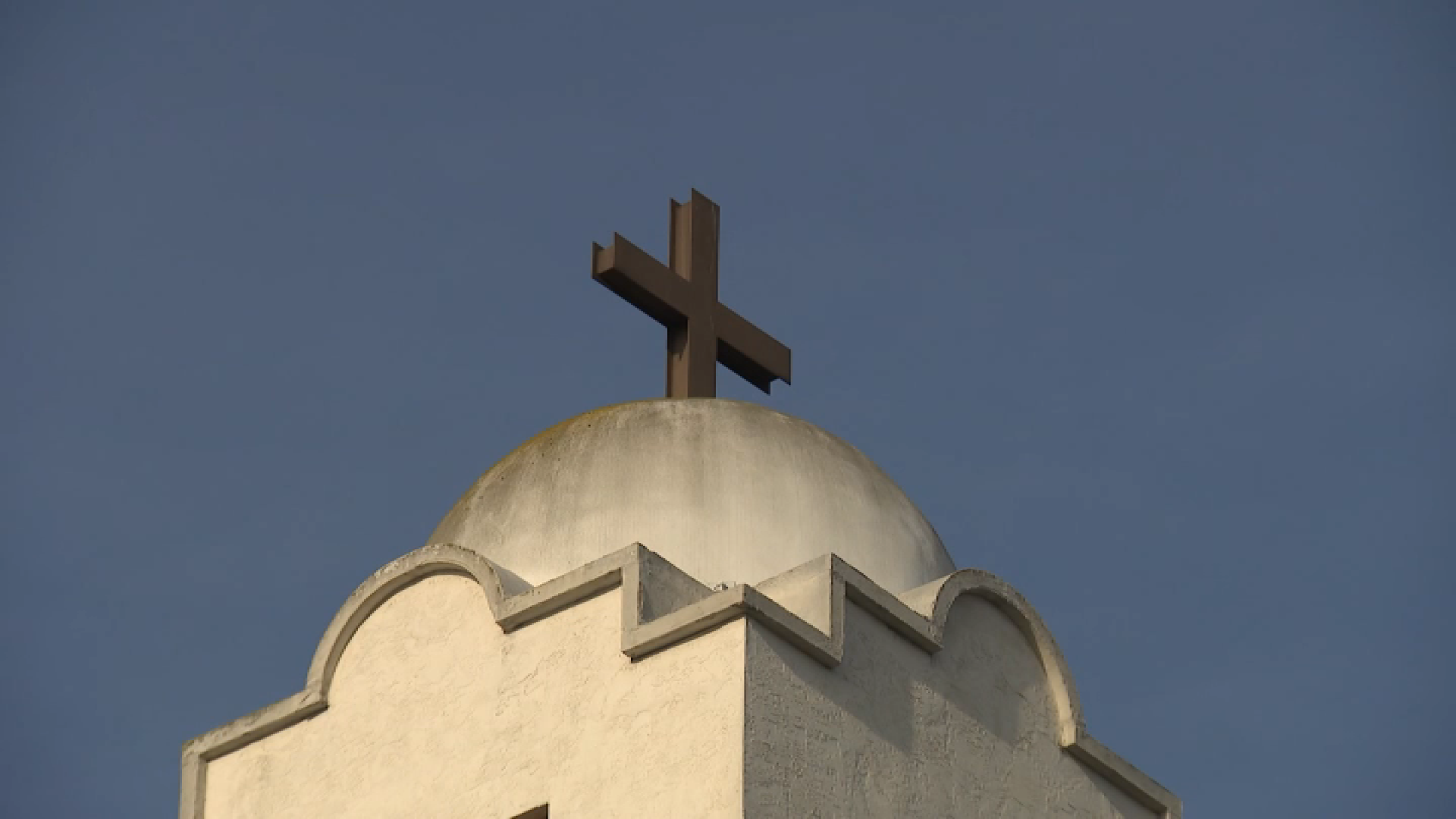Human Rights Organization Amnesty International is condemning U.S. attacks on border journalists, attorneys, and humanitarian aid workers. Including people who were targeted in a controversial surveillance program. The Organization has issued a new report accusing both the U.S and Mexico of harassment and intimidation. NBC 7 Investigates’ Mari Payton reports.
What started as a cordial conversation with a U.S. Customs and Border Protection (CBP) agent quickly dissolved when an agent scanned Pastor Kaji Dousa’s passport at the San Ysidro Port of Entry. Dousa had been in Tijuana, Baja California late last year, counseling and praying with asylum seekers. She also officiated at the wedding of a migrant couple.

But when Dousa tried crossing north into San Diego on January 2, she said the border agents’ attitude changed markedly after they checked her identification. Dousa said CBP agents took her to a back room, where she said she sat alone for hours. The agents eventually escorted Dousa to a cubicle, where they interrogated her about her ministry with the migrant caravan.
Two months later, on March 6, 2019, attorney Luis Guerra was advising asylum seekers in Tijuana who were preparing to present their asylum claims at the San Ysidro Port of Entry. Guerra, who works for the nonprofit Al Otro Lado, said he counseled the migrants to dress warmly because he’d heard that some asylum seekers were detained in CBP facilities for days at a time. But while he was talking with those asylum seekers, Mexican authorities approached Guerra and threatened to arrest and deport him, even though he has dual citizenship in Mexico and the U.S. Guerra later said the Mexican authorities told him they were instructed by CBP officers to threaten him.

On that same day in March, nearly 300 miles away near the Lukeville, Arizona Port of Entry, Ana Adlerstein, and Emily Saunders were in Mexico, informing a family of 16 about how to properly request asylum protection from the United States. But when Alderstein and Saunders reached the Port of Entry, CBP agents accused them of breaking the law. The two social activists claim the agents accused them of illegally “coaching” migrants how to cross illegally, which they both deny.
Those are three examples from a newly-released report by Amnesty International that blames both the U.S.and Mexican governments for “a politically motivated campaign of harassment against individuals and organizations that defend, educate or document migrants requesting asylum protection along the southern border.”
Amnesty International researchers claim the U.S. Department of Homeland Security (DHS) and Department of Justice (DOJ) have “exploited legal ambiguities” and used tactics of intimidation, threats, restrictions and legal harassment on immigration advocates, activists, attorneys, and journalists along the southern border.
Local
Read the report below.
On the same day Guerra, Adlerstein and Saunders were allegedly harassed by border agents, NBC 7 Investigates reported the discovery of a secret government surveillance program carried out at the San Ysidro Port of Entry. Documents confirm that agents created a watchlist and database to monitor and collect information on 59 individuals tied to the migrant caravan, including 10 journalists and three attorneys.
This surveillance appears to have been conducted by a bi-national law enforcement operation of U.S. and Mexican authorities called the Operation Against Smugglers Initiative on Safety and Security or OASISS, according to a logo emblazened on the database documents.

Agents from CBP, Immigration and Customs Enforcement (ICE,) Homeland Security Investigations (HSI,) the San Diego sector of the U.S. Border Patrol and the F.B.I. were involved in the surveillance program, according to the Homeland Security source that shared the documents with NBC 7 back in March. The source spoke on the condition of anonymity, given the sensitive nature of what they were divulging.
NBC 7’s reporting on the surveillance program and CBP’s treatment of individuals listed in the database are cited throughout the Amnesty International report.
Additional documents obtained by NBC 7 and published on March 6, 2019, reveal those individuals flagged in the government database were subjected to increased scrutiny when they crossed the U.S. Mexico border. Some had alerts placed on their passports, which prevented at least two photojournalists and attorneys from entering Mexico to work. Others told NBC 7, and researchers with Amnesty International, that their electronic devices -- including phones and laptops -- were subject to legal but controversial warrantless searches.
The surveillance program, along with heightened security at Ports of Entry and criminal investigations into alleged human smuggling, were launched under “Operation Secure Line,” the federal government’s response to the arrival of the migrant caravan along the southern border in late 2018.
In December of 2018, one month after Operation Secure Line was announced, David Shaw, the Special Agent-in-Charge of Homeland Security Investigations in San Diego, ordered his agents to increase their intelligence-gathering efforts on the migrant caravan, according to a December 2018 email obtained by NBC 7.

By the end of the month, agents placed alerts on the passports of the 59 people listed in the database, flagging them for “secondary inspections” when crossing the border.
Amnesty International’s report directly challenges the propriety of those tactics.
“The U.S. [DHS and DOJ] have increasingly misused and leveraged the criminal justice system to deter and punish those individuals for challenging or even simply documenting the systematic human rights violations by U.S. Authorities against migrants and asylum seekers,” the report states.
One law that DHS and DOJ have repeatedly cited as a legal basis for these actions is U.S. Code 1324, which prohibits “human smuggling” into the U.S. and allows agents to arrest anyone who encourages or induces an illegal crossing.
Amnesty International claims the Trump Administration has wrongfully used the law to investigate and/or prosecute, “its perceived political enemies - including activists, journalists, and lawyers,” tied to the migrant caravan or working with asylum seekers in general.
On May 9, 2019, CBP officials cited the law as a legal basis for the surveillance program at the San Ysidro Port of Entry. In a letter to more than 100 civil rights organizations that had voiced opposition to these surveillance methods used at the San Ysidro Port of Entry, CBP said agents were investigating a number of journalists who were suspected of possibly violating the law by assisting migrants to cross the border illegally.
The official said those alleged actions were one reason why the journalists were added to the database. But none of the journalists or attorneys listed in the database documents have been charged with a crime.
Amnesty International notes that on December 4, 2018, a federal appeals court declared the use of U.S.C 1324 was unconstitutional, saying it “criminalizes a substantial amount of protected expression,” including “both speech and conduct.”
But the appeals court agreed to delay its implementation of the ruling, and in June, the Trump administration asked the U.S. Supreme Court to review that appellate court decision.
Among its recommendations to Congress, DHS, and DOJ officials, Amnesty International asks that all prosecutions under U.S.C. 1324 be halted and that Congress consider amending the law to include a “humanitarian exemption.” The report also says guidance should be issued to DHS and DOJ personnel regarding enforcement of the law to ensure it’s not wrongly applied to people who are exercising free-speech, humanitarian, or human-rights-related activities.
Some experts have withheld criticism of the government’s controversial border surveillance program.
Alan Bersin, who served as Commissioner for Customs and Border Protection under President Barack Obama, recently told NBC 7 that the federal agencies appear to have clear authority to compile the watchlist and use other enforcement tactics.
Peter Nunez, a former U.S. attorney and border enforcement director in the George H.W. Bush administration, said agents cannot force anyone to answer questions, but can freely question those crossing the border in their effort to maintain safety and order.
Amnesty International also wants CBP to stop placing alerts on the passports of those associated with or documenting the caravans. The organization claims those alerts are used to undermine the legal efforts of humanitarian aid workers, attorneys, and journalists.
Several of the people included in the watchlist documents obtained by NBC 7 have had alerts placed on their passports, which they claim has severely limited their ability to cross the border into Mexico.
Immigration attorney Nora Phillips, who is also listed in the database, said she has been denied entry into Mexico since an alert was placed on her passport.
Phillips told NBC 7 that she first encountered the problem in January when Mexican immigration officers detained her for hours after she arrived at the Guadalajara airport. Phillips said the flag on her passport promoted Mexican officials to deny her entry into that country and forced her to return to the United States.
“That was one of the most traumatic experiences of my entire life, and I never want to go through it again,” Phillips said.
Complaints about passport alerts are in Amnesty International’s report as an example of how U.S. citizens have been “discriminatorily targeted...in relation to their legitimate professional activities.”
Those citizens include Pastor Dousa, who also had an alert placed on her passport.
To read her story, click here.



